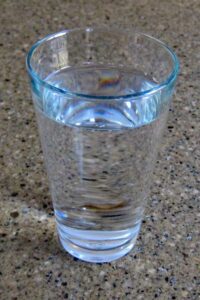When we think about nourishing our bodies, most of us fixate on the foods we eat. Which diet should I follow? Which will give me the right balance of protein, carbohydrates, and fat? Should I take supplements and, if so, which ones? Amidst all this musing, we give little thought to an incredibly important element of our daily intake: WATER.
As adults, we are all roughly 50-70% water by weight. Water is the primary component of all body parts and plays a major role in numerous life-sustaining functions. According to the “rule of threes,” we can survive only 3 minutes without breathable air, 3 days without drinkable water, and 3 weeks without food.
So, what does water do for us?
 Water produces saliva that begins the breakdown of foods in our mouths. Drinking water before, during, and after a meal supports healthy digestion. It also gives the stomach a means to register fullness, thereby moderating the impulse to overeat.
Water produces saliva that begins the breakdown of foods in our mouths. Drinking water before, during, and after a meal supports healthy digestion. It also gives the stomach a means to register fullness, thereby moderating the impulse to overeat.
Water helps dissolve vitamins, minerals, and other nutrients from our food. It uses the bloodstream to transport these nutrients to every cell in our bodies. It keeps our cell membranes moist and provides the means for them to grow, reproduce, and thrive. It also helps our skin look its best.
Water helps excrete waste from our systems through sweat, urination, and bowel movements. Appropriate water intake is protective against urinary tract infections, kidney stones, and hemorrhoids. And when we consume the recommended daily dose of fiber to feed our good gut bacteria, adequate water ensures that all this roughage doesn’t turn to “concrete” on its way out of our systems!
Water lubricates our joints and cushions sensitive tissues in our spinal cords and brains. It’s the body’s built-in shock absorber. The brain also uses water to manufacture hormones and neurotransmitters.
Water regulates our internal body temperature through sweat and respiration. And since breath is naturally humidified, we expel water even when our bodies chug along at the optimal temperature.
How much water do we need?
The U.S. National Academies of Sciences, Engineering, and Medicine deems an adequate daily fluid intake to be 15.5 cups for men and 11.5 cups for women. These recommendations account for water from all sources – water, other beverages, and food. As such, the “rule of thumb” of consuming eight 8-ounce glasses of water per day should generally do the trick.
Water intake needs to increase if living in a hot, humid climate or exercising strenuously to account for the body’s water loss via sweat to lower body temperature. Airplane travel can lead to dehydration due to the dry cabin air. You also need to drink more water if feverish or subject to fluid loss through vomit or diarrhea.
Note: For each pound of body weight lost in exercise, you need to rehydrate with 16-24 ounces of fluid. A high quality sports drink helps replenish fluid and electrolytes while providing a source of calories for fuel.
How do I know if I’m getting the right amount of water?
Check out the color of your urine first thing in the morning. If you are adequately hydrated, it will look like pale lemonade. If there’s very little discharge or it looks like apple juice, it’s time to pour yourself a tall glass of water! Other signs of dehydration include unexpected weight loss, confusion, dry skin that’s hot to the touch, and elevated core body temperature.
Note: There’s a lag time between the onset of dehydration and thirst. If you are thirsty, you are already running low on fluids.
Is it possible to drink too much fluid?
The gastrointestinal track can only handle 1-2 liters of water at a time. Flood your system with fluids and your kidneys can’t keep up with the deluge. The resulting overhydration dilutes sodium in the blood – a condition called hyponatremia – which could lead to a life-threatening medical emergency, such as cerebral edema.